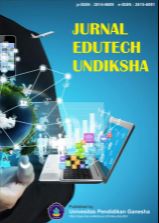PENGARUH MODEL MAKE A MATCH BERBANTUAN MULTIMEDIA PEMBELAJARAN DAN MOTIVASI BELAJAR TERHADAP HASIL BELAJAR PKn
DOI:
https://doi.org/10.23887/jeu.v2i1.3587Abstrak
Permasalahan pembelajaran PKn di SMP Negeri 2 Singaraja adalah rendahnya hasil belajar pada siswa kelas VIII. Penelitian ini bertujuan (1) mengetahui perbedaan hasil belajar yang signifikan antara siswa yang mengikuti pembelajaran kooperatif tipe Make a Match berbantuan multimedia pembelajaran interaktif dan pembelajaran konvensional, (2) mengetahui perbedaan hasil belajar PKn yang signifikan antara siswa yang mengikuti pembelajaran kooperatif tipe Make a Match berbantuan multimedia pembelajaran interaktif dan pembelajaran konvensional pada kelompok siswa dengan motivasi belajar tinggi, (3) mengetahui perbedaan hasil belajar PKn yang signifikan antara siswa yang mengikuti pembelajaran kooperatif tipe Make a Match berbantuan multimedia pembelajaran interaktif dengan pembelajaran konvensional pada kelompok siswa dengan motivasi belajar rendah, (4) mengetahui pengaruh interaksi pembelajaran dan motivasi belajar terhadap hasil belajar PKn. Jenis penelitian adalah eksperimen semu. Populasi penelitian adalah seluruh kelas VIII berjumlah 571 orang. Penelitian ini menggunakan rancangan posttest only control group design dengan sampel kelas VIII.8, VIII.9, VIII.10 dan VIII.11. Data dikumpulkan menggunakan metode kuesioner dan tes dengan instrumen kuesioner motivasi belajar dan tes hasil belajar. Data dianalisis dengan teknik analisis statistik deskriptif dan statistik inferensial ANAVA dua jalur. Hasil penelitian menunjukkan (1) terdapat perbedaan hasil belajar PKn yang signifikan antara kelompok siswa yang mengikuti pembelajaran kooperatif tipe Make a Match berbantuan multimedia pembelajaran interaktif dengan pembelajaran konvensional, (2) terdapat perbedaan hasil belajar PKn yang signifikan antara siswa yang mengikuti pembelajaran kooperatif tipe Make a Match berbantuan multimedia pembelajaran interaktif dengan pembelajaran konvensional pada kelompok siswa dengan motivasi belajar tinggi, (3) terdapat perbedaan hasil belajar PKn yang signifikan antara siswa yang mengikuti pembelajaran kooperatif tipe Make a Match berbantuan multimedia pembelajaran interaktif dengan siswa yang mengikuti pembelajaran konvensional pada kelompok siswa dengan motivasi belajar rendah dan (4) terdapat pengaruh interaksi model pembelajaran dan motivasi belajar terhadap hasil belajar PKn.Kata Kunci : hasil belajar PKn, make a match, motivasi, multimedia
The problem faced in the civic education learning at the 8th grade in SMPN 2 Singaraja was a low learning outcomes. This research aims (1) known the differences of learning outcomes of civic education between students who followed cooperative learning types make a match assited multimedia interactive learning and conventional learning; (2) known the differences of learning outcomes of civic education between students who followed cooperative learning types make a match assited multimedia interactive learning and conventional learning on the students with high motivation; (3) known the differences of learning outcomes of civic education between students who followed cooperative learning types make a match assited multimedia interactive learning and conventional learning on the students with low motivation; (4) known the interaction between learning model and learning motivation to civic learning outcomes. This research was quasy experimental. Population of this research was all of students on 8th grade which the total was 571 students. This research used draft of posttest only control group design with the sample of this research was VIII.8, VIII.9, VIII.10 and VIII.11. Data were collected by questionnaire and test method with learning motivation questionnaire instrument and test result of learning. The data obtained were analyzed with descriptive statistic analysis techniques and inferential statistics namely ANAVA Two Way. The result of this research shows that; (1) there is significant differences learning outcomes of civic education between students who followed cooperative learning types make a match assited multimedia interactive learning and conventional learning, (2) there is significant differences learning outcomes of civic education between students who followed the learning with cooperative learning types make a match assited multimedia interactive learning and the conventional learning of students with high motivation, (3) ) there is significant differences learning outcomes of civic education between students who followed the learning with cooperative learning types make a match assited multimedia interactive learning and the conventional learning of students with low motivation, and (4) there is significant interaction between learning model and learning motivation to civic learning outcomes.
keyword : civic learning outcomes, make a match, motivation, multimedia
Diterbitkan
2014-07-23
Cara Mengutip
., N. P. H. D., ., D. D. P. P., & ., I. G. W. S. S. S. M. (2014). PENGARUH MODEL MAKE A MATCH BERBANTUAN MULTIMEDIA PEMBELAJARAN DAN MOTIVASI BELAJAR TERHADAP HASIL BELAJAR PKn . Jurnal Edutech Undiksha, 2(1). https://doi.org/10.23887/jeu.v2i1.3587
Terbitan
Bagian
Articles
Lisensi
Authors who publish with the Jurnal EDUTECH Undiksha agree to the following terms:
- Authors retain copyright and grant the journal the right of first publication with the work simultaneously licensed under a Creative Commons Attribution License (CC BY-SA 4.0) that allows others to share the work with an acknowledgment of the work's authorship and initial publication in this journal.
- Authors are able to enter into separate, additional contractual arrangements for the non-exclusive distribution of the journal's published version of the work (e.g., post it to an institutional repository or publish it in a book), with an acknowledgment of its initial publication in this journal.
- Authors are permitted and encouraged to post their work online (e.g., in institutional repositories or on their website) prior to and during the submission process, as it can lead to productive exchanges, as well as earlier and greater citation of published work. (See The Effect of Open Access)














